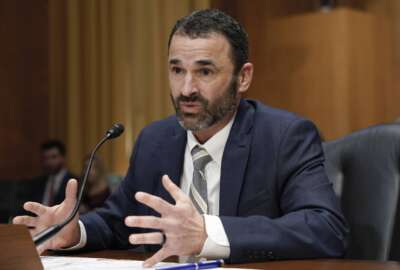Hubbard Radio Washington DC, LLC. All rights reserved. This website is not intended for users located within the European Economic Area.
On Air: Federal News Network
Trending:
Small businesses carrying weight of shutdown on their payrolls
Many small and large businesses are turning to cash reserves to pay bills, including employee salaries, as the government stops processing invoices. There could...
wfedstaff | April 17, 2015 5:40 pm
The Technology Resource Center of America sent a crew 600 miles to Panama City, Fla., on Oct. 1 to work on a telecommunications project on a military base. After being assured they were to show up whether there was a government shutdown or not, TRCA’s crew was turned away at the gate.
Integrity Management Consulting heard the same assurances from two of its customers — there was funding for their project even if the government shuts down.
But when two teams of employees showed up at their federal worksites on the first day of October, they too were told to go home.
Integrity and TRCA are just two examples of dozens and dozens of small firms frustrated by the uncertainty and inconsistency from the government. And they are increasingly worried about the future of their business, especially if the government shut down continues into a fourth or fifth week, or even longer.
Federal contractors haven’t gotten paid by the government in two weeks. And even if the government shutdown ends this week, they still may have to wait another month to see any income.
This sudden standstill of the federal cash flow means many federal contractors, especially small ones, are teetering on edge of collapse.
“I basically have to pay that crew [in Florida] regardless of whether they do that work or not,” said John Hunnicutt, the director of federal sales for TRCA, which is located in Dallas. “We have instances like NASA on the West Coast where I have a guy sitting out there and I honestly don’t know if I’m going to get paid or not. We continue to pay his payroll, fairly sizable for small company. But I don’t have any clue what’s going on in the government. It definitely has us on pins and needles.”
Credit remains tight
TRCA is like many small firms. It relies on banks to float it credit while waiting for the government to pay its bills. Banks know the government is good for the money so the credit line is considered low risk.
But many small firms are finding it more difficult to get a line of credit that is necessary for several weeks of payroll as banks have not returned to the lending levels as before the 2008 banking crisis.
Therefore when the shutdown hit, small businesses were forced to use cash reserves to meet payroll.
And that can only last so long.
“One of our greatest fears at this point obviously is cash flow. I think that’s any business of our size. I think that’s any business period,” said Kim Hayes, the CEO of the Ambit Group, a service-disabled veteran owned small business. “As hopefully we see an end to the shutdown, it’s not even the impact today, tomorrow or two weeks from now, it’s the impact 45 days from now, 60 days from now when payments are not being received or there are delays in the payments. That’s not criticism, just a statement of facts. It’s a little frightening.”
Contractors are holding out some hope to recover some of the money lost during the shutdown-the silver lining in all of this shutdown frustration.
Some vendors may be able to bill the government for the costs of a stop work order under the shutdown.
“The costs of stop work orders are generally allowable, but not necessarily,” said Rob Burton, a former deputy administrator in the Office of Federal Procurement Policy and now is a partner with the law firm Venable in Washington. “They may not be allowable, for example, under an indefinite delivery, indefinite quantity contract where the government has already purchased the minimum quantity required under that arrangement, or under a requirements contract where the failure of the requirements to materialize is a risk the contractor accepted when it entered into the arrangement. Then, last but not least, the contractor has to be able to prove damages. And that can be very difficult to do. You have to show you were damaged by the stop work order, and that is not always the case. Contractors have a hard to proving damages.”
Some contracts include allowable costs
Burton said those costs that are allowable usually fall under firm fixed price and cost-plus type contracts that aren’t under an IDIQ vehicle.
“You have to have good documentation showing any type of monetary impact on your company,” he said. “You have to show exactly what kind of costs was incurred. They will be looking at actual costs and actual damage to the company.”
But even that money wouldn’t come for weeks, and could end up costing many vendors more in lawyer fees than they would receive.
In the meantime, the shutdown’s impact on all businesses means some will have to make tough decisions in the coming weeks.
Trey Hodgkins, senior vice president of the global public sector at TechAmerica, an industry association, said small firms may be forced to consider their future as a federal contractor.
“They will have to figure out if they can keep doing this work. I think you will see some companies go out of business,” Hodgkins said. “I think others are going to look at this and say, ‘I’m not going to do this business anymore.’ And you will have others who will exit the public sector market and decide not to be in a space where they have these challenges. They will work in the commercial space where there is plenty of demand for what they sale. Or they are a business unit of a larger corporation and why bother? This persisting fiscal uncertainty is a real challenge for businesses and their ability to plan and sustain their business models.”
He added concerns about liquidity aren’t just for small businesses.
“It breaks out into two groups. There are the essentials, which may still be performing, but most of the agencies and departments, the people who get the invoices and process them for payment, ostensibly those have deemed non-essential and are not there,” Hodgkins said. “So you are working, but you don’t have that income to make the payroll and capital expenditures you may have to perform on a contract.”
The other group is non-essential contractors. Hodgkins said companies have to figure out how to keep those employees at the ready for when the shutdown ends.
Many companies are doing just that.
Continuing education
One executive, who works for a large federal contractor and who requested anonymity because the executive didn’t get permission to speak to the press about the shutdown, said some staff are being told to take two or three days off a week. Most are using their vacation first and then, if the shutdown continues, would be forced to take leave without pay.
Other large business executives say their company issued guidance requiring employees to catch up on their training courses or to stay busy by working on future bids.
Mary Beth Romani, the chief strategy officer of Integrity Management Consulting, said the small business is trying to take advantage of the shutdown by offering training that normally would be hard to coordinate.
“Two of our large teams were affected by the shutdown on Oct. 1.We had a business development training set up within 24 hours,” she said. “Literally within 24 hours we got a conference room at a hotel near us and had 30 people in a conference room learning how to do color team reviews so we can engage our team. That’s a training we would’ve liked to involve people, but it’s hard to get them back from client sites, so we seized the moment.”
Romani said Integrity also has employees working on bids for requests for proposals expected in the coming months.
But for Integrity, TRCA, Ambit and many others the savings account will run dry in a matter of weeks. And the training sessions and extra work also will run out, leaving them with no cash flow from the government and minimal federal work.
Romani said all of this will impact their revenues and salaries of their sales force.
“We are looking at a quarter million dollars impact on our top line, revenue loss because of the shutdown. So that’s obviously going to translate into an effect into profit and loss,” she said. “For the people who are on incentive compensation plans, we have always taken a pragmatic approach and looked at things that are outside of people’s controls and evaluate the numbers. We always take the things out of people’s controls into account.”
No break on profit and loss goals
Integrity’s approach is not the case for every company. The industry executive said many large firms don’t care if there is a shutdown when it comes to profit and loss. The executive said the companies will hold their sales people to their revenue goals. And if they didn’t make their numbers, the sales person may see a smaller bonus or no bonus at all.
The executive said sales people may have to help win new work or renegotiate existing contracts in the wake of the shutdown to pull out more revenue.
But that too may be difficult as the government is delaying solicitations and requests for quotes, and awards from fiscal 2013.
Michael Fischetti, the executive director of the National Contract Management Association and a former federal acquisition official, said the acquisition delays will not be short term.
“It will carry through the entire year because programs will have to be adjusted and budgets will have to be adjusted, and we don’t know where this is all heading,” he said.
Fischetti said companies will have plenty of questions that need answering including those around a firm’s long-term viability, status of key RFPs and how to keep high quality staff engaged and at the ready.
“I think the effects will be the entire fiscal year and going into 2015,” he said.
Hunnicutt said TRCA is waiting on at least five awards. Romani said Integrity also is waiting to hear back on several bids from August and September.
Ambit Group’s Hayes said the shutdown, and delays in RFPs and awards will limit or even stop investments in the business both in terms of people and hardware.
“We have projects that we have been awarded at the end of the government year that are not taking off. They’re in stalemate as we wait to see what happens. We have projects that were due to have expansions that are not expanding. We have offer letters that have extended that had to be withdrawn,” she said. “The last few years in the federal marketplace have been difficult. We always budgeted this year to be flat-lined. What if the worst happens and you don’t grow? But it’s not about growth, it’s about the ability to do good work, to continue to offer good employment opportunities to your staff. It’s been very hard to recruit people who are interested in working in the federal space in the last several years because of the upheaval. The image of ‘I work for or with the federal government’ is being tarnished, and it makes it harder to incentivize and join us in this mission, which is ultimately serving the mission of government.”
RELATED STORIES:
Contractors do their best to weather shutdown storm
3 things for contractors to consider during the shutdown
Federal events, related services feeling trickledown effect of shutdown
Copyright © 2024 Federal News Network. All rights reserved. This website is not intended for users located within the European Economic Area.
Jason Miller
Jason Miller is executive editor of Federal News Network and directs news coverage on the people, policy and programs of the federal government.
Follow @jmillerWFED





